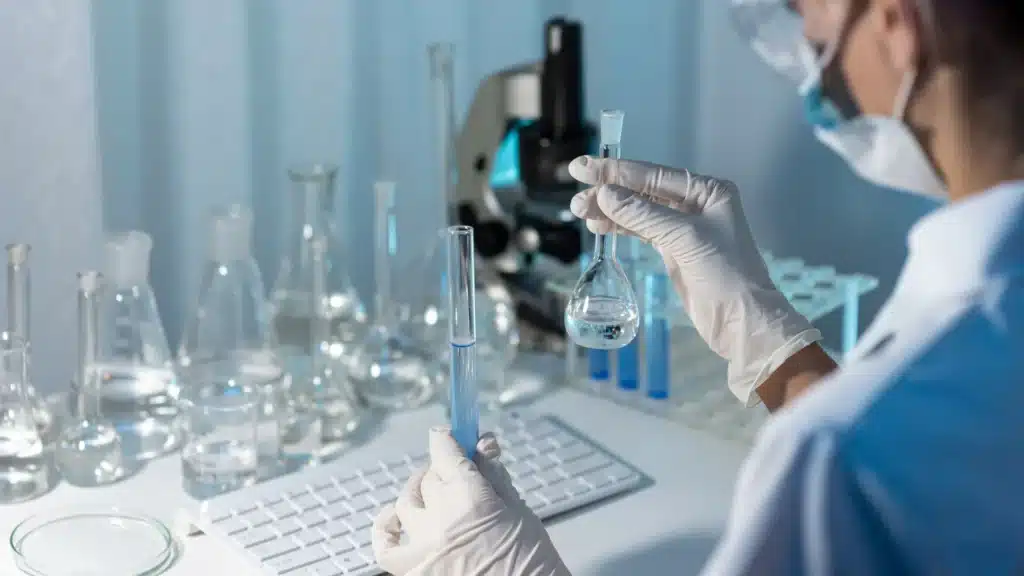A PhD in chemistry, sometimes known as a “chemical PhD” or “PhD chem,” entails a thorough examination of numerous chemical processes, compounds, and their characteristics. Its main goal is to comprehend the structure of particular substances, the changes they go through, and how they react in particular situations. To put it another way, people who have a PhD in chemistry can explain chemical research and its important discoveries while understanding the fundamental scientific ideas. These professionals are in a good position to select from a wide range of careers in public service, industry, and education. The chemical PhD fields are discussed in this article, along with the application process, job market, and other relevant details.
PhD in Chemistry: Basics
One of the three scientific disciplines, chemistry has a profound and wide-ranging impact on our daily lives. It comprises the study of substances, including their properties, composition, and structure. PhD students in chemistry pursue a wide range of research topics, including energy, human health, climate change, industrial chemical reactions, and many more. By using scientific principles, problem-solving techniques, and data analysis, they help to uncover novel approaches in energy, biotechnology, and medicine. Additionally, because their research consistently pushes the boundaries of science, they are sought after as experts in various fields, such as chemical engineering, nuclear energy, renewable energy systems, biomedicine, and medical devices.
Timeline and Structure of Chemistry PhD Programs
Timeline of PhD in Chemistry Programs
A full-time PhD program in chemistry usually lasts three to six years, depending on the destination. For example, it takes 4 years (minimum) in the US and Canada to finish a PhD in chemistry, while it takes 3 years (minimum) in Australia, Germany, and the UK. When it comes to funded PhD positions, students should finish a PhD in chemistry within the minimal timeframe, with a possible extension (6-12 months). For example, you should finish your scholarship-funded PhD in Australia in 3.5 years. If you don’t mind extending your PhD scholarship in Australia, your PhD in chemistry can last up to 6 years (or even longer). Throughout this journey, students spend the majority of their time in chemistry labs.

Structure of PhD in Chemistry Programs
Structured and Semi-Structured PhD Programs
Fully structured PhD programs in chemistry are common in all universities in the USA and Canada. Semi-structured PhD programs are common in Australian universities, some universities, and most non-university research institutes in Germany and France. The curriculum of a PhD in chemistry in such structured PhD programs fosters a comprehensive understanding of the field by combining coursework, seminars, exams, and independent research. PhD programs typically require students to complete a wide range of coursework that provides a solid foundation in chemistry. Advanced chemical synthesis, chemical structures, chemical characterization, biochemistry, and many others are all covered in these courses.
Within these structured PhD programs, students actively participate in seminars in addition to their coursework, which offers a forum for interaction with peers and faculty, idea sharing, and discussion of recent advancements in research. A great distinction is here: at American and Canadian universities, students take comprehensive exams after finishing a heavy semester. These tests evaluate their critical thinking abilities, ability to synthesize knowledge from various sources, and mastery of fundamental concepts. A major turning point in the PhD process is reached when students pass these tests, indicating that they are prepared to conduct independent research. Such tests don’t exist in structured PhD programs at Australian, German, and French universities.
The last phase is a PhD research project that culminates with the completion of a PhD viva and the submission of a dissertation, which is a thorough research report that highlights the student’s unique contributions to chemistry. Original research accounts for a large part of a PhD program. Students make important contributions to chemistry and explore new areas under the direction of a main and a co-supervisor(s). Research projects could entail creating an original synthesis procedure, creating novel polymeric materials, finding novel green polymerization techniques, or carrying out theoretical kinetic studies. This self-directed learning develops the critical thinking, creativity, and inventiveness necessary for success in chemistry.
PhD Research Projects (Individual PhDs)
Individual PhDs don’t have coursework, exams, and mandatory seminars. Students who want to finish a PhD in a shorter timeframe may go through this pathway. An individual PhD is merely founded on a PhD research project, specializing in a field of research, deeper and in more detail. Similar to the structured PhD programs, PhD research project positions end with a PhD viva and dissertation submission. By requiring in-depth research, meticulous analysis, and a clear presentation of findings, the dissertation process showcases the student’s subject-matter expertise and capacity for independent study.

Want to Apply for a Doctorate in Chemistry?
Are you thinking of pursuing a PhD in chemistry? Requirements for applying for a PhD in chemistry can differ significantly, depending on the country and university. A high GPA (normally a minimum of 3 out of 4, or 75%) is usually required for chemistry bachelor’s and master’s degrees at universities with high global university rankings. Additionally, the chances of acceptance are greatly increased by possessing a portfolio of original research papers and review articles published in Q1 or Q2 journals, especially if you are seeking funding. Institutions with higher rankings and increased demand often impose more stringent competitive conditions.
It is advisable to carefully go over the minimum requirements listed on the websites of the universities for the personal essay (such as motivational letters or statements of purpose), recommendation letters, and other CV requirements. It should be clear to non-native English speakers that they must take an English proficiency exam such as the TOEFL iBT, IELTS Academic, or PTE Academic. Although many universities have relaxed the requirements since the COVID-19 pandemic, some still use the GRE general test score as a criterion. If you are looking for an RA-funded PhD position in chemistry, you may contact research supervisors with similar research interests to yours.
Top Destinations to Study a PhD in Chemistry
Pursuing a PhD in chemistry overseas offers you several options if you are interested in conducting specialized research projects for your degree, whether they be theoretical or experimental. The journal Nature ranks the top 10 countries for pursuing a PhD in chemistry as follows: China, the USA, Germany, Japan, England, France, South Korea, India, Canada, and Spain. These rankings are based on evaluations that take the production of articles and their references in scientific journals into account. Therefore, we advise thinking about studying in one of these ten countries if your objective is to conduct research at the cutting edge of scientific discoveries while pursuing a PhD in chemistry abroad.
Trending Areas for Studying a PhD Chem
One of the most popular fields in the fundamental sciences, chemistry provides a wealth of fascinating avenues for scholarly investigation, such as polymer chemistry, physical chemistry, etc. Aspiring academics can customize their studies to fit their unique interests thanks to its wide scope. Current trends indicate a number of interesting research areas that are ready for exploration for those thinking about pursuing a PhD in chemistry. Every one of these disciplines provides an exciting setting where enthusiastic students can investigate challenging scientific issues and significantly advance our understanding. These domains comprise, but are not restricted to:
Organic Chemistry
Organic chemistry is one of the most important branches of chemistry that deals with studying chemical compounds containing carbon elements with “carbon-hydrogen” bonds (hydrocarbons). This field is often referred to as the “chemistry of life”, which deals with the structure, properties, and reactions of organic compounds. The study of organic chemistry helps PhD chem students to identify and classify different natural compounds and create compounds with desired properties and functions as well. Graduates of PhD in chemistry can work in various industries such as pharmaceuticals, fuel, rubber, cosmetics, plastics, detergents, agricultural chemicals, and coating industries.
Inorganic Chemistry
Meanwhile, inorganic chemistry studies the structure, properties, and reactions of non-carbon chemical compounds, or those that do not contain carbon-hydrogen bonds. It can be considered as one of the study fields of PhD in chemistry that deals with inorganic chemicals in nature. It also includes the synthesis and behavior of mineral or organometallic chemical compounds in the Earth’s crust and non-living materials.
Physical Chemistry
Physical Chemistry examines the physical properties of chemical compounds using various laws and concepts of physics, such as motion, energy, force, time, statistical mechanics, quantum chemistry, and thermodynamics. This field is one of the most exciting areas that allows students studying PhD in chemistry to understand the physical properties of chemical compounds such as temperature, volume, pressure, conductivity, plasticity, strength, surface tension in liquids, solubility, viscosity, boiling point, melting point, etc. which are studied using different mathematical models and formulas.
Analytical Chemistry
The identification, separation, and accurate measurement of chemical substances are the main focus of analytical chemistry, a crucial and quantitative area of the chemical sciences. In a variety of industries, such as pharmaceuticals, environmental science, food production, and materials development, it is essential to guarantee the efficacy, safety, and quality of products. Pursuing a doctorate in chemistry within this specialization equips researchers with the sophisticated knowledge and instruments required to identify the existence and concentration of particular compounds in intricate mixtures. In order to solve practical issues and make a substantial contribution to scientific advancement and regulatory standards, doctoral students in this field frequently work with state-of-the-art methods like spectroscopy, chromatography, and mass spectrometry.

Biochemistry
Biochemistry stands out as a crucial area of concentration for individuals pursuing a chemical PhD, emphasizing exploration of the biological structure, composition, and chemical reactions occurring at the cellular and molecular tiers. Encompassing a broad spectrum of living entities, including plants, insects, viruses, microorganisms, and more, biochemistry amalgamates elements of biology with organic, inorganic, and physical chemistry. Within this discipline, a multitude of subjects can be explored, ranging from disease-related inquiries to the chemical foundations of heredity, as well as investigations into how living organisms derive energy from food.
Environmental Chemistry
The study of chemical reactions in the environment and how they affect ecosystems and human health is known as environmental chemistry. It investigates the origins, processes, movement, and destiny of chemicals in soil, water, and air. By examining pollutants like heavy metals, pesticides, and greenhouse gases, this field contributes significantly to our understanding of pollution, climate change, and resource sustainability. Environmental chemists strive to create sustainable materials, manage waste, and lessen pollution. Environmental chemistry contributes to the preservation of natural resources and the advancement of a healthier planet for coming generations by means of research and innovation.
Industrial Chemistry
Industrial chemistry is known as a trend toward the production of new products. In this area of PhD in chemistry, chemical raw products are dissolved, heated, filtered, and various other techniques are used to form a new product with desired specifications and properties. Petrochemical products such as ethylene, propylene, benzene, styrene, and ceramic products including silica brick, ferrite, etc. are among the extensive applications of industrial chemistry.
Polymer Chemistry
Studying for a PhD in chemistry can focus on polymers and macromolecules, which can be utilized in organic chemistry, analytical chemistry, physical chemistry, and nanotechnology. The study of the synthesis, structure, characteristics, and uses of polymers is known as polymer chemistry. Polymers are large molecules made up of repeating subunits known as monomers and are classified into thermoplastics, thermosets, elastomers, and synthetic fibers. To produce materials with particular properties like strength, flexibility, and biodegradability, polymer chemists research various polymerization processes, including addition and condensation polymerization. Innovations in electronics, medicine, and sustainable materials like recyclable polymers and biodegradable plastics have all benefited from advances in polymer chemistry. Polymer chemistry is still driving environmental sustainability and technological advancement with continued research.
Nuclear Chemistry
The study of nuclear reactions, particularly those employed in the diagnosis and treatment of different diseases, is part of this trend, as the name implies. This area of study for a PhD in chemistry focuses on nuclear transformations, radioactivity, and processes. It investigates nuclear imaging technologies, radiation detection methods, and the behavior of radioactive isotopes. Researchers in this field create radiopharmaceuticals for diagnostic imaging and cancer treatment, among other medical applications. Nuclear chemistry is also essential to space exploration, environmental monitoring, and energy production. Developments in this area support safer radiation treatments, better handling of radioactive waste, and creative uses across various sectors.
Job Positions After a PhD in Chemistry
Students who opt to pursue PhD positions in chemistry can explore diverse job titles within the chemistry field. However, a common question that arises for them is: What is the optimal field for undertaking a PhD in chemistry? Students are perpetually searching for the most lucrative job opportunities in chemistry to secure a high income. To address this inquiry, this section delves into the income levels and career prospects in various fields associated with a chemical PhD. The compiled information here will assist you in comparing the income potential across different chemistry specializations.
All Chemistry Branches: Chemistry Professors
If you have completed your PhD in chemistry in any field, universities, colleges, and research institutes would be suitable workplaces. Chemistry professors are responsible for imparting the principles of this science to students. Given the conceptual nature of physical chemistry, it is an excellent foundation for comprehending and conveying complex ideas related to chemical and physical phenomena and their interrelationships. On Applyindex, you have access to a wide array of assistant professors, associate professors, and professors from around the world. Any of them could potentially serve as your future academic supervisor. So, feel free to visit their profile, obtain their email addresses, and reach out to them without hesitation.
Organic Chemistry: Food Science Expert
Possible and proper workplaces for this field of study would be laboratories, food processing industries, and farms. As practical additional details, you would better know that food science experts are employed in agriculture and food. They examine the chemical composition of food and perform various experiments on them. Knowledge of organic chemistry helps food scientists understand the chemical reactions between food ingredients. Their tasks include increasing the usable life of food, improving its nutritional value, and inventing new food production methods. According to the prospects, 6% growth in the number of employments is expected until 2029, which is higher than the average of other fields. Based on the available statistics, food science experts earn about $70,000 annually on average.
Organic Chemistry: Environmental Expert
Environmental specialists typically work in labs, environmental institutes, consulting firms, government organizations, educational institutions, etc. The existence and impacts of chemicals in the environment are investigated by environmental chemists. They look for pollutants in soil and water, investigate their behavior in the environment, and ascertain how they impact the lives of plants and animals. According to research, employment in this field is predicted to grow by 8% until 2029, which is higher than the average for other fields. Additionally, you will typically make around $70,000 annually working in this field of study.
Organic Chemistry: Forensic Expert
Suitable job opportunities for forensic experts are often defined in police departments and criminology laboratories. Forensic chemists, also known as forensic analysts, assist police departments and other law enforcement agencies by analyzing samples of organic material left at crime scenes. They are responsible for collecting samples and analyzing them in laboratories. Many forensic chemists have degrees in organic chemistry and are trained to perform tasks such as analyzing blood and tissue samples and running toxicology-related experiments and tests. 14% growth in the number of employment for forensic experts is expected until 2029, much higher than the average of other jobs. The calculated average income for forensic experts for each year is $72,000.
Inorganic Chemistry: Laboratory Chemistry Expert
Generally, we can say that academic institutes and drug manufacturers would be the most suitable workplaces for laboratory chemistry experts. Laboratory chemistry experts are responsible for researching and testing products and chemicals. They often work in laboratories or chemical or pharmaceutical companies. A 3% growth in the number of job opportunities in this field is expected until 2029. Also, the average income for laboratory chemistry experts is calculated as $40,000 approximately.
Industrial Chemistry: Oil and Petrochemical Expert
Oil, gas, petrochemical, industrial, and drilling sites would be the best available choices for oil and petrochemical experts. Oil and petrochemical experts design suitable and optimized methods to extract oil and gas from underground reserves. They are responsible for monitoring the processes of extraction and production of petrochemical products. Prospects suggest a 3% growth in job opportunities in this field until 2029. The annual average income for the oil and petrochemical experts is $75,000. 1.7% growth in the number of employments in this field is expected until 2029, which is lower than the average for other jobs. Also, the annual average income for laboratory chemistry experts is approximately $64,000.
Physical Chemistry: Laboratory Technician or Manager
Food, chemical, pharmaceutical, and governmental organizations are the best possible selections for laboratory technicians and managers. Laboratory managers and technicians supervise the performance of other experts and researchers. These chemical scientists often start working as laboratory experts and over time reach the position of management. Anticipates expected 5% growth in the number of job opportunities in this field until 2029, which is higher than the average of other jobs. The calculated average income for the oil and petrochemical experts for each year is $75,000.

Biochemistry: Biomedical Engineer
As a PhD chem graduate with a focus on biomedical engineering, you may find opportunities in healthcare centers, governmental agencies, as well as research or academic institutions. Biomedical engineers play a crucial role by integrating scientific and engineering principles to design and optimize equipment, systems, and techniques, ultimately enhancing the healthcare system. Typically, biomedical engineers work collaboratively in interdisciplinary teams alongside healthcare professionals, engineers, and other scientists. Projections suggest a 5% growth in job opportunities for biomedical engineers until 2029, surpassing the average growth rate for other occupations. Additionally, the average income for laboratory chemistry experts is estimated at approximately $92,000.
Biochemistry: Biochemist
Biochemists find suitable roles in healthcare centers, governmental agencies, and research or academic institutions. Their expertise lies in studying the chemical aspects of biological processes in organisms, encompassing areas such as cell growth, disease, and heredity. In laboratory settings, biochemists conduct biochemical tests and meticulously analyze the collected data. Collaboration is a key aspect of their work, often participating in research projects within interdisciplinary teams. A 5% growth in employment opportunities within this field is anticipated until 2029. On average, biochemists earn approximately $94,000 annually.
Conclusion
A PhD in chemistry offers a profound and dynamic journey into the depths of chemical science, spanning multiple subfields such as organic, inorganic, analytical, physical, and environmental chemistry. This degree equips scholars with the advanced expertise needed to tackle real-world challenges across industries like healthcare, energy, agriculture, and academia. With strong global demand, especially in countries like China, the US, and Germany, PhD chemists enjoy promising job prospects and competitive salaries. Whether aspiring to become professors, researchers, or industry experts, graduates contribute meaningfully to innovation and societal advancement. Choosing the right specialization, university, and research focus is essential for maximizing career growth and scientific impact.
Frequently Asked Questions (FAQs)
What is the main goal of a PhD in chemistry?
It aims to explore the structure, properties, and transformations of substances, advancing scientific understanding and practical applications.
Which countries are best for pursuing a PhD in chemistry?
Top choices include China, the US, Germany, Japan, and England, known for their research output and institutional excellence.
What are the most in-demand PhD chemistry fields?
Organic, biochemistry, analytical, and industrial chemistry are currently popular due to their wide applications and career prospects.
What is the average salary for PhD chemists?
Salaries vary by field, but biochemists earn around $94,000 annually, while other roles range between $40,000 and $92,000.



